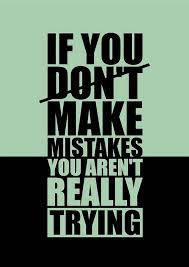Making mistakes
“Mistakes are a fact of life. It is the response to error that counts.” – Nikki Giovanni.

As humans, we are imperfect creatures and as such we are prone to making mistakes.
I can readily admit to that. I have made my share of mistakes and have lived to tell about it. The key is to realize that things happen and while we do not like it, when something wrong happens we should look to correct it, learn from it, and move on.
That is what we hope would happen. However, in many cases that does not occur. In fact, some of us fret over doing something wrong, so much so that we may stay awake at night and lose precious sleep over it whether it has or may happen.
Atelophobia is the extreme fear of imperfection. Someone with this disorder may be terrified of making mistakes, or go to great lengths to avoid new situations because they can’t guarantee that they’ll succeed.
That is a problem.When we are so consumed with not wanting to do something wrong, we do nothing at all, which can cause even more serious problems. While we may think that doing nothing is ok, it is in actuality doing something. And we have now ceded any outcome to someone or something beyond our control.
“Anyone who has never made a mistake has never tried anything new” – Albert Einstein

As individuals we are facing challenges that we may have never encountered before.
It’s a lot to handle. It’s OK to be concerned, but it’s not OK to do nothing at all about things
“No one can reduce mistakes to zero, but we can learn to harness our drive to prevent them and channel it into better decision-making – ” Alice Boyes
In order to overcome this, she offers six tips.
- Don’t be ashamed of your fear
The culture we live in glorifies fearlessness, but fear is a rational reaction to hard situations and it’s there for a reason.
Your concern about making mistakes is there to remind you that we’re in a challenging situation. Deal appropriately with it.
2. Use emotional agility skills
Emotional agility keeps you from decision paralysis. Identify your feelings. Then, say them out loud to help diffuse them. Finally, accept reality and act on them with your values.
Identify your most important values related to decision-making in a crisis. Then ask yourself how each of those is relevant to the important choices you now face.
3. Focus on your processes
We can control systems, not outcomes. What are your systems and processes for avoiding making mistakes? The things you are worrying about can be the same things that help you avoid making mistakes.
When you worry, it should be solutions-focused, not focusing on the presence of a threat. Direct your worry towards actions that will realistically reduce the chances of failure.
4. Broaden your thinking
Worry and fear can lead to narrow thinking. That is the opposite of what you want because you need to be able to consider all outcomes.
It might seem illogical that you could reduce your fear of making a mistake thinking about other negative outcomes. But this strategy can help kick you into problem-solving mode and lessen the mental grip a particular fear has on you.
5. Recognize the value of leisure
Pulling an all-nighter to solve a problem might work once or twice, but you need to focus on ways to make yourself a better decision-maker in the long term and not lose precious sleep over it.
We need leisure (and sleep) to step back, integrate the threads of our thinking, see blind spots, and think creatively.
6. Detach from the noise
Try not to engage in frenzied behavior like constantly monitoring the news or checking data. This can result in information overload. Your mind can become so overwhelmed that you start to feel shut down. Recognize if you’re doing this and limit over-monitoring or over checking.
“Learn from the mistakes of others. You can’t live long enough to make them all yourself.” – Eleanor Roosevelt.

Next Steps
It is established that we are all human and as such are imperfect and make mistakes, sometimes repeatedly. With that being the case, there should be no reason why we are adverse to such, even that we do not like it and hate having to clean things up afterwards.
That said, we should not fear making mistakes, just realize that it will happen (Hopefully only from time to time) and get on with our lives. Dreading it and losing sleep over it is not a good way to live.
Rather dealing with it as a part of life and who we are and striking it off of the list of, What Keeps Us Awake at Night” is a better way to deal with it.